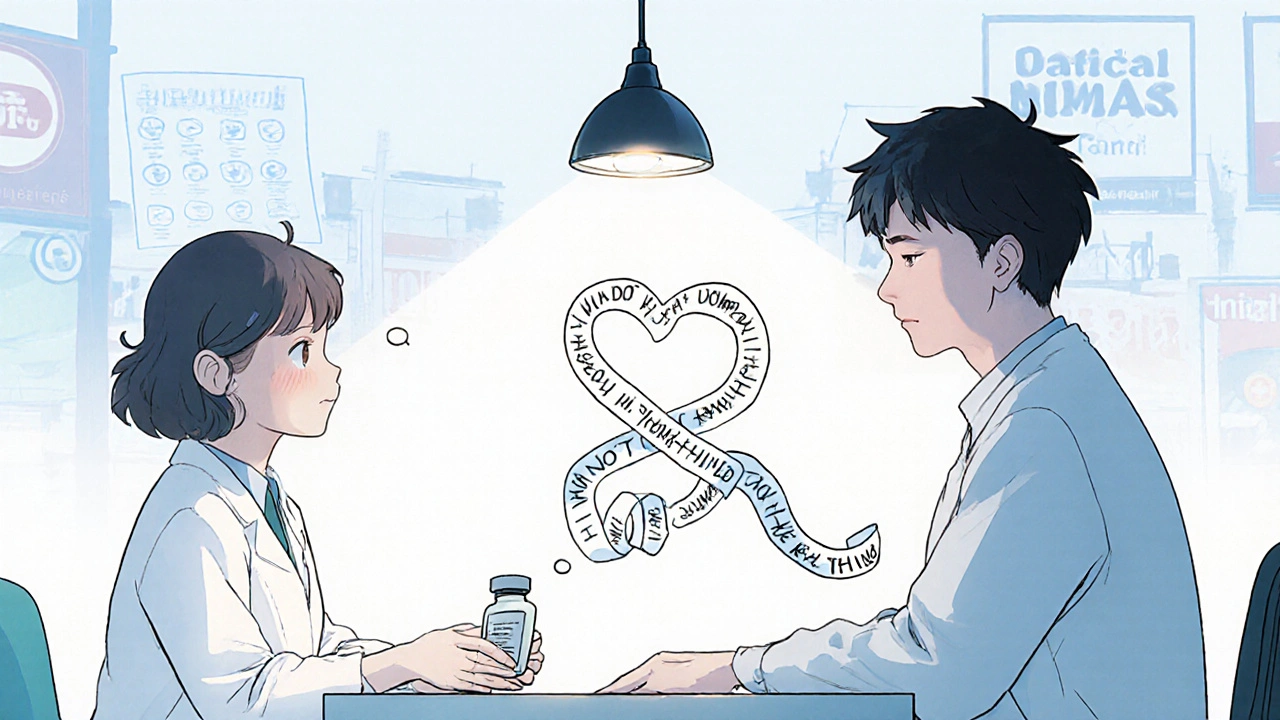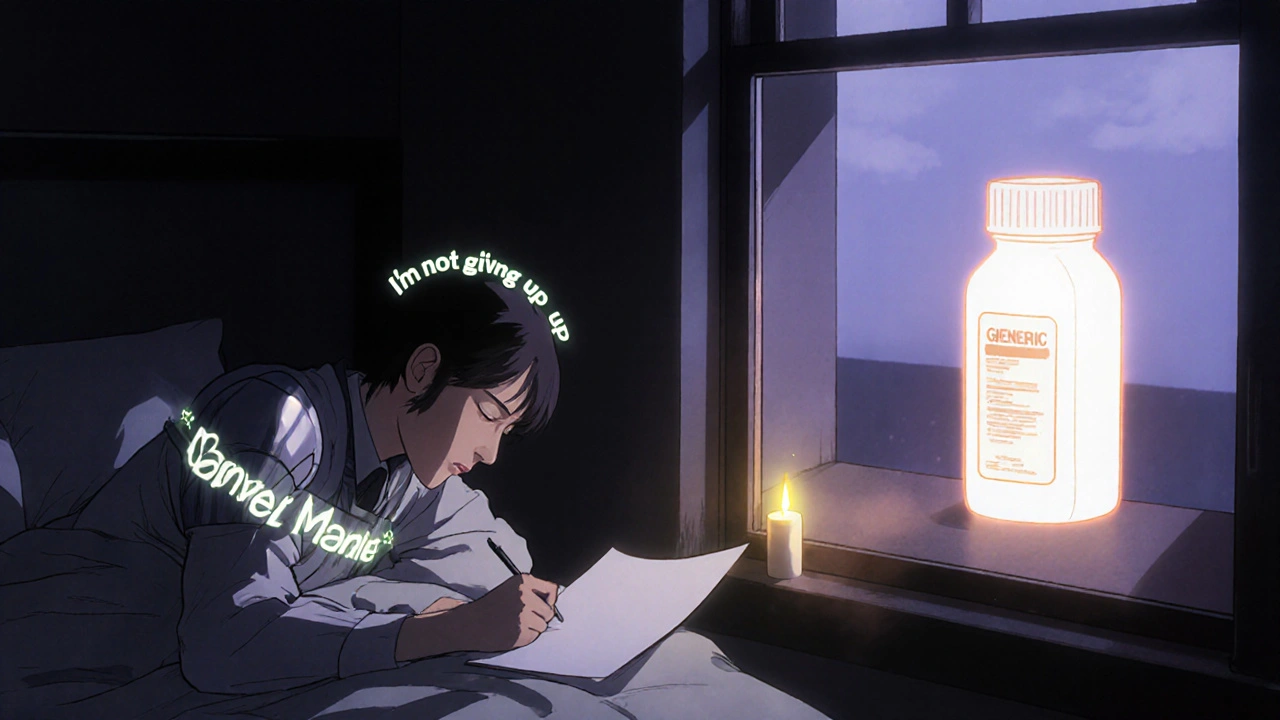
It’s not about the chemistry. It’s not even about the price. It’s about the story you tell yourself when you swallow that little white tablet.
Generic medications are chemically identical to their brand-name counterparts. They’re tested, approved, and often cost 80% less. Yet, millions of people still refuse them-not because they’re afraid of side effects, but because they don’t believe they’ll work. And that belief? It’s shaped by stories.
Narrative medicine isn’t poetry in a hospital. It’s not about writing essays. It’s the quiet, powerful act of listening-really listening-to how patients describe their illness, their fear, their hope. And those stories? They decide whether a patient takes their medicine, or leaves it on the counter.
Dr. Rita Charon, the physician who started this movement at Columbia University in 1996, called it narrative competence. That’s the ability to hear a patient’s story, understand its weight, and let it change how you treat them. It’s not optional. It’s the difference between compliance and real healing.
Think about the last time you bought a generic painkiller. Maybe you picked it because it was cheaper. But did you feel good about it? Or did you think, "This isn’t the real thing"?
That thought? It’s a story. And it’s not yours alone.
Pharmaceutical companies spend billions building brand stories. They show happy families, doctors in white coats, sleek packaging. They make you feel like the brand is the cure. Generics? They come in plain bottles. No ads. No testimonials. Just a label with a name you’ve never heard of.
It’s not that people think generics are unsafe. They think they’re less meaningful. And meaning matters more than molecules.
A 2023 study in The Permanente Journal found that patients who felt heard by their doctors were 3 times more likely to stick with a treatment-even if it was generic. Why? Because their story was acknowledged. Their fear was named. Their doubt wasn’t dismissed. It was held.
When a doctor says, "This is just as good as the brand", it’s not enough. That’s a fact. But what patients need is a story that makes that fact feel true to them.
One patient I spoke with-let’s call her Linda-was diagnosed with high blood pressure. Her doctor prescribed a brand-name drug. She took it for months. Then her insurance changed. She was switched to the generic. Within two weeks, she stopped taking it.
"I felt like I was being punished," she told me. "Like the system didn’t think I deserved the real medicine. Like I wasn’t worth it."
That’s not about pharmacology. That’s about identity. Her story had shifted from "I’m managing my health" to "I’m being treated as less than".
Narrative medicine doesn’t fix that by giving her more pills. It fixes it by asking: "What did that switch mean to you?"
When clinicians learn to ask that question-without rushing to answer-they create space for truth. Linda’s doctor didn’t argue. She listened. Then she said: "You’re right. It does feel like a downgrade. But here’s what’s true: your body doesn’t know the difference. And you deserve to feel safe in your own skin. Let’s talk about how we make that real for you."
Linda started taking the generic again. Not because she was told to. But because her story was rewritten-with her, not for her.

Narrative medicine isn’t fluffy. It’s rigorous. At Columbia, medical students spend hours reading memoirs, analyzing poems, and writing about their own experiences with illness. Why? Because stories are data.
When a patient says, "My heart feels like it’s drowning," they’re not being dramatic. They’re using metaphor. And that metaphor tells you more about their fear than any lab result ever could.
Doctors trained in narrative medicine learn to notice silence. To pause when a patient looks away. To ask, "What’s the hardest part of this for you?" instead of "Do you have any side effects?"
That shift changes everything.
At the Veterans Affairs Whole Health Library, clinicians use narrative techniques to help patients process trauma. One veteran, after years of avoiding his diabetes meds, finally started taking them after writing a letter to his younger self: "I’m sorry I let you down. But I’m here now. I’m not giving up."
That letter didn’t lower his blood sugar. But it gave him a reason to care.
Generic drugs work. But they need a story to land.
Here’s what works-based on real clinics using narrative medicine:
It’s not manipulation. It’s alignment.

Not every clinic has time for deep conversations. Not every pharmacist has training in narrative skills. And that’s the problem.
Healthcare is built on efficiency. But healing isn’t efficient. It’s messy. It’s emotional. It’s human.
When systems push patients through like numbers, stories get lost. And when stories disappear, so does trust. And when trust is gone? No pill-no matter how cheap or clean-will work.
The answer isn’t more money. It’s more attention.
Columbia University now requires all medical students to take narrative medicine seminars. Why? Because they’ve seen the data: doctors who listen to stories have patients who take their meds. Who show up for appointments. Who live longer.
It’s not magic. It’s method.
Generics aren’t the enemy. The real enemy is the idea that medicine is only about science.
It’s also about meaning. About dignity. About being seen.
The next time you hand someone a generic prescription, don’t just say, "This is fine."
Ask: "What does this mean to you?"
Listen.
Then help them write a new ending.
Because the most powerful drug in the world isn’t in a bottle. It’s in a story that says: You matter. And your healing matters too.
Narrative medicine is a practice where healthcare providers learn to listen deeply to patients’ personal stories about illness, fear, hope, and identity. Developed by Dr. Rita Charon in the 1990s, it uses techniques from literature and storytelling-like close reading, reflective writing, and guided dialogue-to help clinicians understand the emotional and psychological layers behind a patient’s condition. It’s not about replacing science; it’s about making science more human.
People don’t just take medicine because it works-they take it because they believe it works. Generic drugs are chemically identical to brand-name versions, but they often lack the emotional weight that comes with advertising, packaging, and reputation. If a patient’s story is that "only the brand is real," they’ll reject the generic-even if it’s safer and cheaper. Narrative medicine helps reframe that story by connecting the medicine to the patient’s values, identity, and lived experience.
Yes. Studies show that when patients feel truly heard, they’re more likely to stick with treatment plans-including taking generics. A 2023 study in The Permanente Journal found that patients whose stories were acknowledged showed higher engagement, lower anxiety, and better adherence. For providers, narrative medicine reduces burnout by helping them reconnect with the human purpose of their work, rather than just checking boxes.
No. While it’s often used in mental health, oncology, and chronic disease, it applies to every interaction where a patient feels unheard-whether it’s a flu shot, a blood pressure pill, or a diabetes test. Even in acute care, the way a patient understands their condition affects their choices. A story about feeling powerless can lead to skipping meds. A story about being in control can lead to long-term adherence.
Pharmacists can start by asking open-ended questions: "What are your thoughts about switching to this generic?" or "Has anything made you unsure about taking this before?" They can share brief, authentic stories of their own or their patients’ experiences. They can also give patients a moment to write down what they need to feel confident. Small moments of listening build trust-and trust builds adherence.
It’s here to stay. More medical schools, including Columbia, now require narrative training. The American Medical Association and VA health systems have integrated it into standard practice. As healthcare shifts toward patient-centered care and addresses clinician burnout, the need for human connection grows. Narrative medicine isn’t a trend-it’s a return to the core of medicine: listening to the person, not just the disease.
If you’re a clinician: Start one conversation today. Ask a patient, "What’s the hardest part of taking this medicine?" Don’t fix it. Just listen.
If you’re a pharmacist: Keep a simple notebook. Jot down one story a week from a patient about their medication experience. Over time, you’ll see patterns-and you’ll know how to help.
If you’re a patient: If you’re avoiding your meds because you don’t trust them, write down why. Then ask your provider: "Can we talk about what this means to me?" Your story isn’t extra. It’s essential.
The pill is just the beginning. The real healing starts with the story you tell about it.
Let’s be real-this isn’t about stories. It’s about pharma’s marketing machine brainwashing people into thinking price = quality. The generic is chemically identical. The placebo effect is real, but it’s not a substitute for evidence. If you need a story to believe in a pill, maybe you’re not ready for science.
And don’t get me started on "narrative competence"-sounds like a buzzword invented by academics who’ve never worked a 12-hour shift in an ER. Patients don’t need poetry. They need reliable, affordable meds. The rest is noise.
THIS IS WHY AMERICA IS FALLING APART. We got people takin generic pills like its some kinda socialist plot. BRAND NAME = TRUST. PERIOD. Who even wrote this? Some lefty doc who thinks feelings cure cancer? LOL. I got a cousin on generics-he got worse. Now he’s on dialysis. Coincidence? I THINK NOT.
Also why is Columbia teachin this? We got real problems. Like illegal immigration and woke teachers. Not some feel-good storytime for pills. #MakeMedicineGreatAgain
As a pharmacist for 18 years, I’ve seen this play out a thousand times. The story matters more than the molecule. I had a veteran who refused his generic blood pressure med because he said, "The blue pill my VA gave me last year made me feel like I was a failure."
So I started telling him, "That blue pill didn’t make you a failure. Your courage did. This pill? It’s just helping you keep going. Same chemistry. Same results. Just a different color."
He started taking it. Two months later, he brought me a handmade card. Said he finally felt like he wasn’t being punished.
That’s not fluff. That’s medicine. ❤️
so like… if the generic works but you think it dont… it dont? lol
weird but kinda makes sense. my grandma took generics for 20 yrs and still kicked ass. but my cousin swore the brand was "stronger" and kept buying it even when it cost 5x. guess what? same results. just more debt.
story matters. dumb but true. 😅
This article is dangerously naive. Equating anecdotal patient narratives with clinical efficacy is not only unscientific-it’s ethically irresponsible. Narrative competence is not a substitute for pharmacokinetic data. If patients are rejecting life-saving medications due to psychological bias, the solution is education, not emotional manipulation.
Furthermore, encouraging clinicians to "rewrite" patient narratives risks paternalism. Who gets to decide what story is "better"? The doctor? The pharmacist? This is a slippery slope toward medical authoritarianism disguised as empathy.
Generic pills are just as good. End of story. People who dont take them are weak minded. They need to be told to grow up. No one cares about your feelings when your BP is 200 over 110. Take the damn pill. Or die. Your choice.
Stop coddling patients with stories. We got real problems. Like inflation. Like crime. Like bad medicine. This is a distraction.
Also Columbia? More like Communist University. LOL
I get what they’re saying. But honestly? Sometimes you just need the blue pill. Not because it’s better. But because it makes you feel like you’re still in control.
My mom switched to generic thyroid med and started having panic attacks. Not because it didn’t work. Because she felt like she was being replaced. Like she wasn’t worth the real thing.
We switched back. For a few months. Just so she could breathe. Then we slowly transitioned again-with her writing a note to herself about being strong. It worked.
Not magic. Just… human.
And yeah, I cried reading this.
As someone who grew up in Nigeria, then moved to the U.S., I’ve seen both sides. In Lagos, people take generics because they have to. No stigma. No stories. Just survival.
Here? People treat generics like they’re second-class citizens. It’s not about the pill. It’s about status. About dignity. About believing you deserve the best-even if the best is just the same chemical.
And you know what? That’s okay. We don’t have to shame them. We just have to meet them where they are. Tell them a story that honors their fear. Not dismisses it.
Medicine isn’t just science. It’s culture. And culture changes slowly. But it changes.
Okay but wait-what if the story isn’t about the pill at all? What if it’s about the doctor who didn’t listen? The nurse who rolled their eyes? The 12-minute visit where they never asked how you felt?
Maybe the generic isn’t the problem. Maybe the system is the villain. We’re blaming the pill because it’s easier than fixing healthcare.
I took a generic for anxiety. Didn’t work. Not because it was generic. Because my doctor didn’t adjust the dose. Didn’t ask if I was sleeping. Didn’t care. I stopped taking it. Not because I doubted the science. Because I doubted the person prescribing it.
Story isn’t about the pill. It’s about the person holding it.
Generic meds are controlled by Big Pharma. They own the brand names AND the generics. They make you think you’re saving money but they just switch the label. Same factory. Same workers. Same profits.
They want you to believe the story that generics are equal so you’ll take them and stop asking questions. But the real drugs? The ones that actually heal? They’re not on the shelf. They’re in labs. Locked up. Because curing people doesn’t make money. Keeping them sick does.
Don’t be fooled. The story is a trap.
Oh wow. A 3,000-word op-ed on how to make people feel better about taking cheap pills. How novel. Let me guess-this was written by someone who’s never had to pay for their own meds? Or maybe they just like the sound of their own voice.
Narrative medicine? More like narrative nonsense. We don’t need therapists in white coats. We need more competition. Lower prices. Less hand-holding.
And for god’s sake, stop romanticizing Columbia. They’re a tuition mill with a fancy humanities department. This isn’t medicine. It’s therapy for people who think they’re too good for science.
lol so the pill dont work unless u believe in it? then why do animals take meds and get better? they dont have stories. they dont even know what a pill is.
so if a dog takes a generic and lives longer… does that mean the dog believes in it?
nah. the pill just works.
stop overthinking. take the damn thing. your body dont care about your feelings. it just wants the chem.
This hit me in the chest. I work in a clinic where we have patients who skip meds because they think they’re not good enough. I used to just say, "It’s the same thing." Now I say, "This is yours. You chose it. It’s here to help you live the life you want."
One lady cried and said, "No one’s ever said that before."
It’s not about changing their mind. It’s about changing how they feel about themselves.
Thank you for writing this. I’m printing it out for my team.